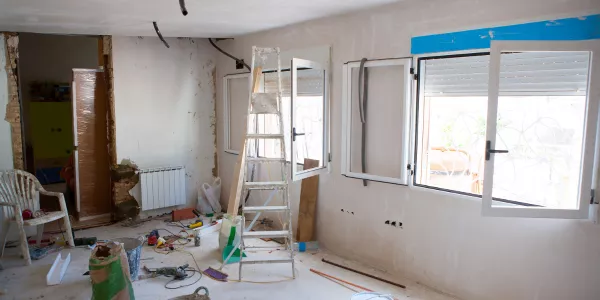You are going through real estate listings and suddenly the term “needs a little TLC” shows up. Different from the popular usage, Tender, Loving Care (TLC), when referring to a home could mean that the property in question needs quite a bit of work and patience before you start living there.
If you are interested in learning more about TLC homes, their impact in the real estate market and how a TLC property can become a good investment, count on Homeshift Team to provide you with reliable, easy to understand answers.
What does TLC mean in real estate?
Tender, Loving Care (TLC) in real estate is a euphemistic way of saying that the house is in severely poor condition and needs extensive renovation. In a romantic view, we can say that you like the house the way it is at the moment, and with a lot of care, one day, it will become the home you love.
Is a home that needs ‘TLC’ sold ‘as-is’?
Homes that are listed as TLC are often sold “as-is”. And it means that the seller is unwilling to do any repairs in the house. You get what you see. “TLC” and "as-is" carry different meanings in real estate.
“As-is” means that the owner doesn’t want or isn’t able to fix up the house. But neither term necessarily eliminates the chance of a negotiation between you and the owner after all the known issues are disclosed.
The difference between ‘TLC’ and ‘fixer-upper’
They are usually used interchangeably, since both are terms open to interpretation about the condition of the property. Sometimes fixer-upper means that a house needs minor repairs and cosmetic fixes, but sometimes it also means that the house needs a complete renovation and might involve structural work. The same is true for the term “TLC”.
Impact of TLC in the real estate market
For sellers, using the term TLC might be a good strategy. It shows that they are aware of the home’s situation and are willing to price it accordingly. Doing that, they can attract a specific segment of buyers: those looking for a fixer-upper investment.
For the buyers, it impacts the amount of work they will have on their hands. They will acquire a property much cheaper if compared to the market, and once renovated it can become a great investment. But the buyer needs to make a careful inspection to weigh if the cost of the renovation and the amount of work is worth the investment.
How does TLC become a good investment?

A TLC house can become a great bargain if, even after taking into account the extra money and time you will spend renovating the house, it is still a deal.
If you are a handy person and know how to do minor repairs (those that don't need a professional), even better! Doing some of the work yourself will definitely save you some money.
A TLC home will give you the chance of remodeling the house according to your taste and style, which can result in saving money upfront.
What are the cons of TLC?
Probably the fact that the house isn’t “move-in ready” is the major con of a TLC home. If the house needs foundation, roof, HVAC system, and/or plumbing repairs you better have the budget required to invest.
You’ll have to hire a licensed contractor to comply with zoning laws and building codes, and this will add to your total costs. If the time of repair is too long, maybe it isn’t a good investment, since you probably will pay the mortgage plus the expenses of your current home.
I’ve decide to buy a TLC and I’m ready to make an offer
To make an offer you probably want to identify parts of the house that need repair and ask for a discount on the final price. It might not sound good to sellers, but it is worth a try.
To identify the repairs you can start with the basics like testing the lights, the heating and cooling system, and also ceiling fans. Run the water in the sinks and showers and note the condition of the faucets. Check for mold and check electrical sockets.
Other parts to pay attention to are if the doors and windows are sealed, if there is infiltration in the ceiling and if the walls are in good condition. Pay close attention when identifying any sort of leaks.
Look for any cracks in the inside or outside of the house and for sinking areas of soil around the home’s foundation, this can allow water to get into the house.
Calculating costs
When getting to the point of calculating the cost it is advised to estimate the value higher than the calculated costs. Doing so will help you be prepared for any unexpected surprises. You can hire one of our contractors to help you estimate the costs.
People also ask
What should I be wary of when considering a TLC property?
Be wary of underestimating repair costs, overestimating your DIY abilities, and neglecting to get a comprehensive inspection. Structural issues, mold, asbestos, and outdated electrical or plumbing systems can be particularly costly to fix.
Is it better to do the TLC work myself or hire professionals?
It depends on the degree of repair. If the repairs are simple and within your set of skills, it might be worth it, and even fun, to do it yourself. If the magnitude and complexity of the work are beyond what you are comfortable doing yourself, it is better to hire a professional who is aware of the local regulations regarding home renovations.
How much below market value are TLC properties typically priced?
Although it is not a rule, TLC properties tend to be 8% below market value. But keep in mind that values vary depending on location, the extent of repairs needed, and the seller's willingness to lower the price. One of our real estate agents can help you find a fair deal that meets your budget.
Can I finance a TLC property with a traditional mortgage?
When it comes to financing a TLC property you might not be able to do it through conventional mortgage financing, since lenders will not typically finance a home that is not livable.
However, you can explore options like an FHA 203(k) loan, Fannie Mae HomeStyle Renovation, or other types of renovation loans that allow you to finance both the purchase and the cost of repairs.

 Marcio Vasconcelos
Marcio Vasconcelos





